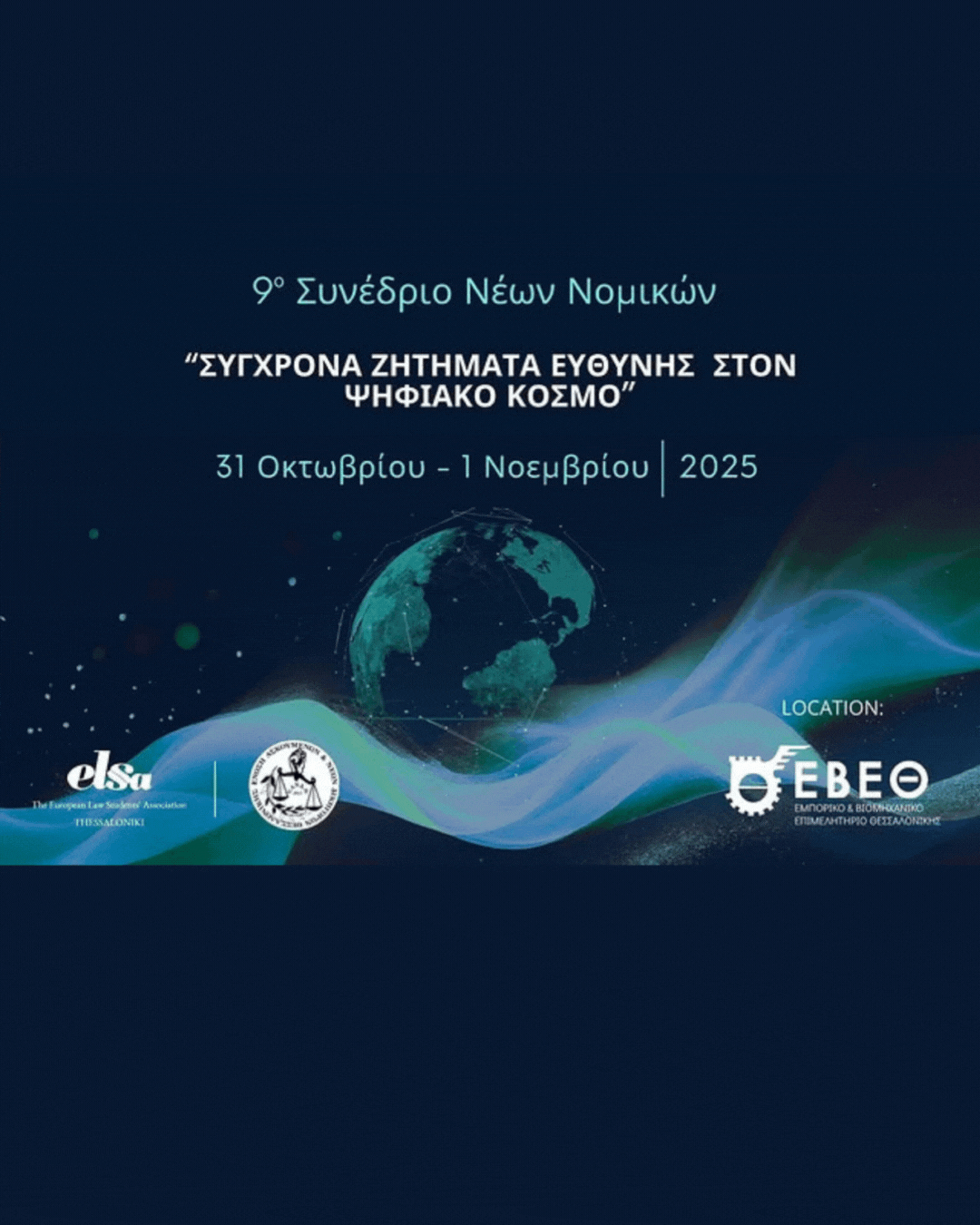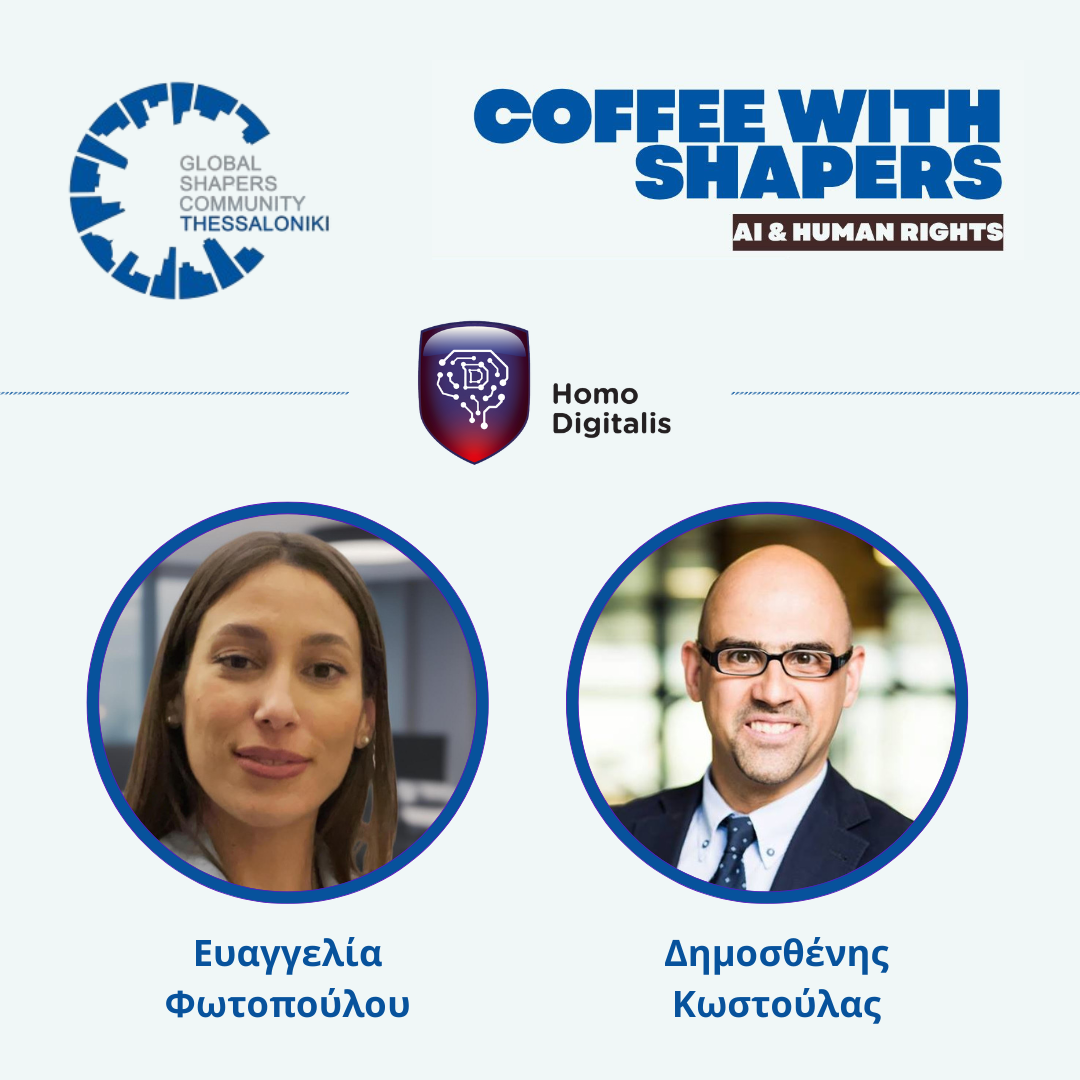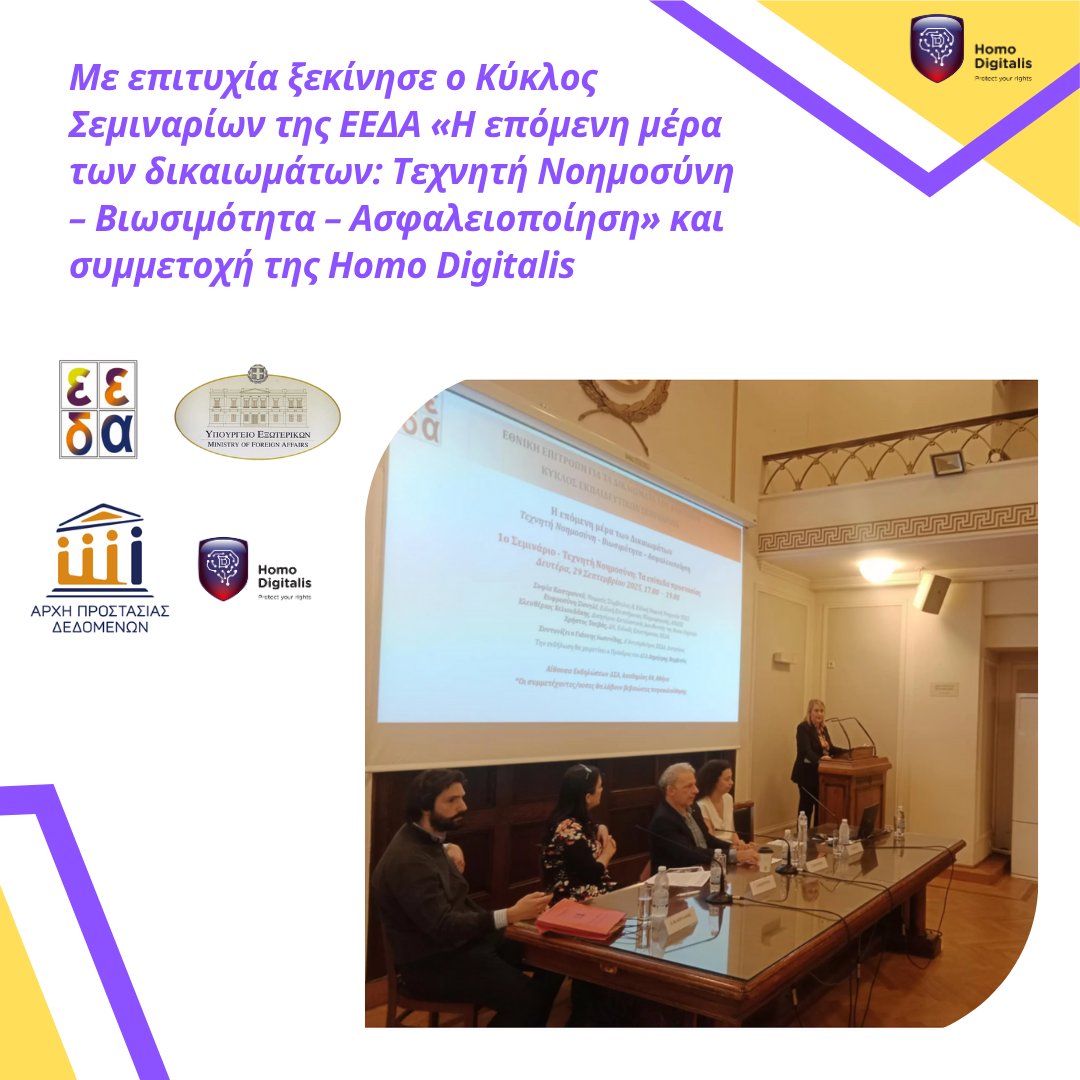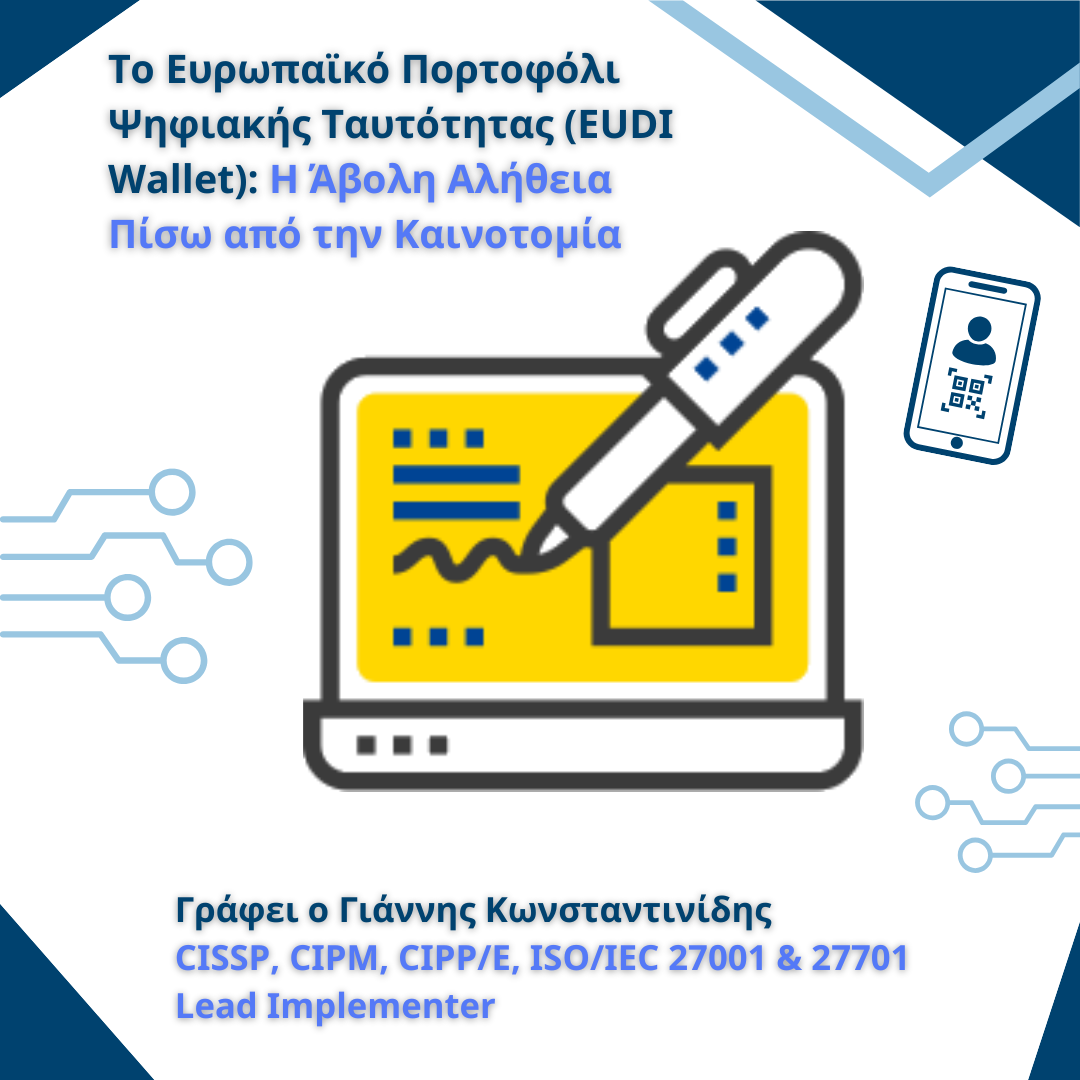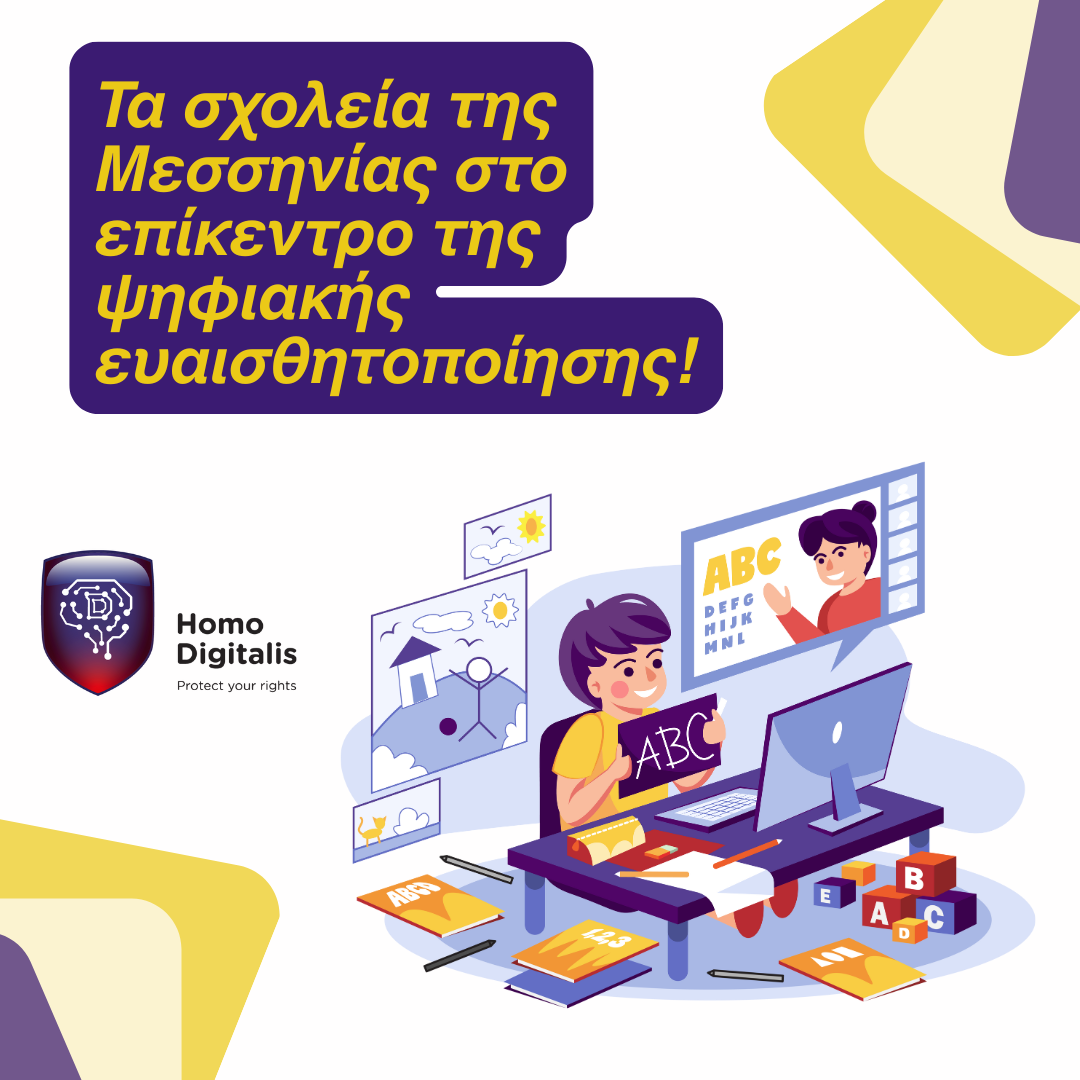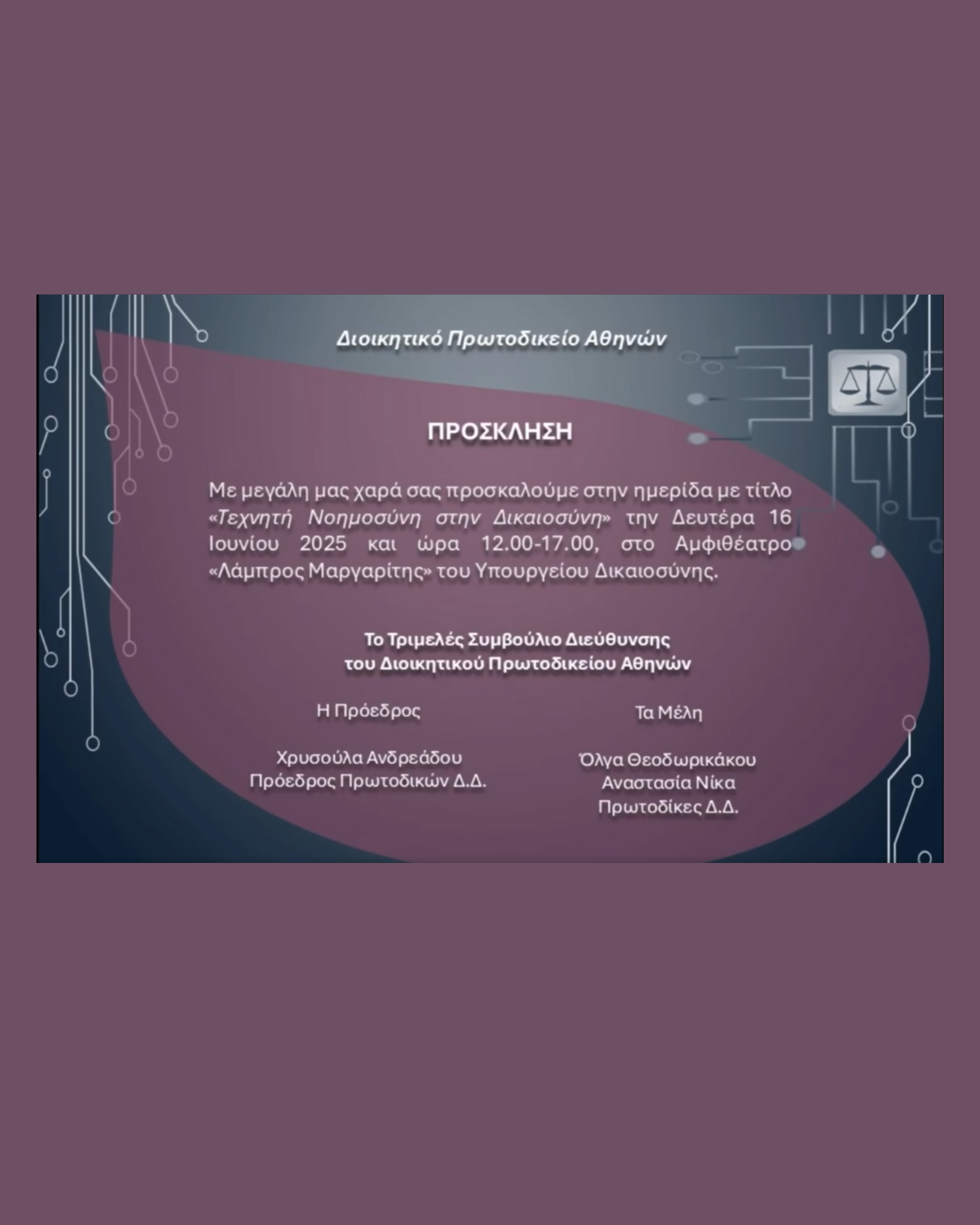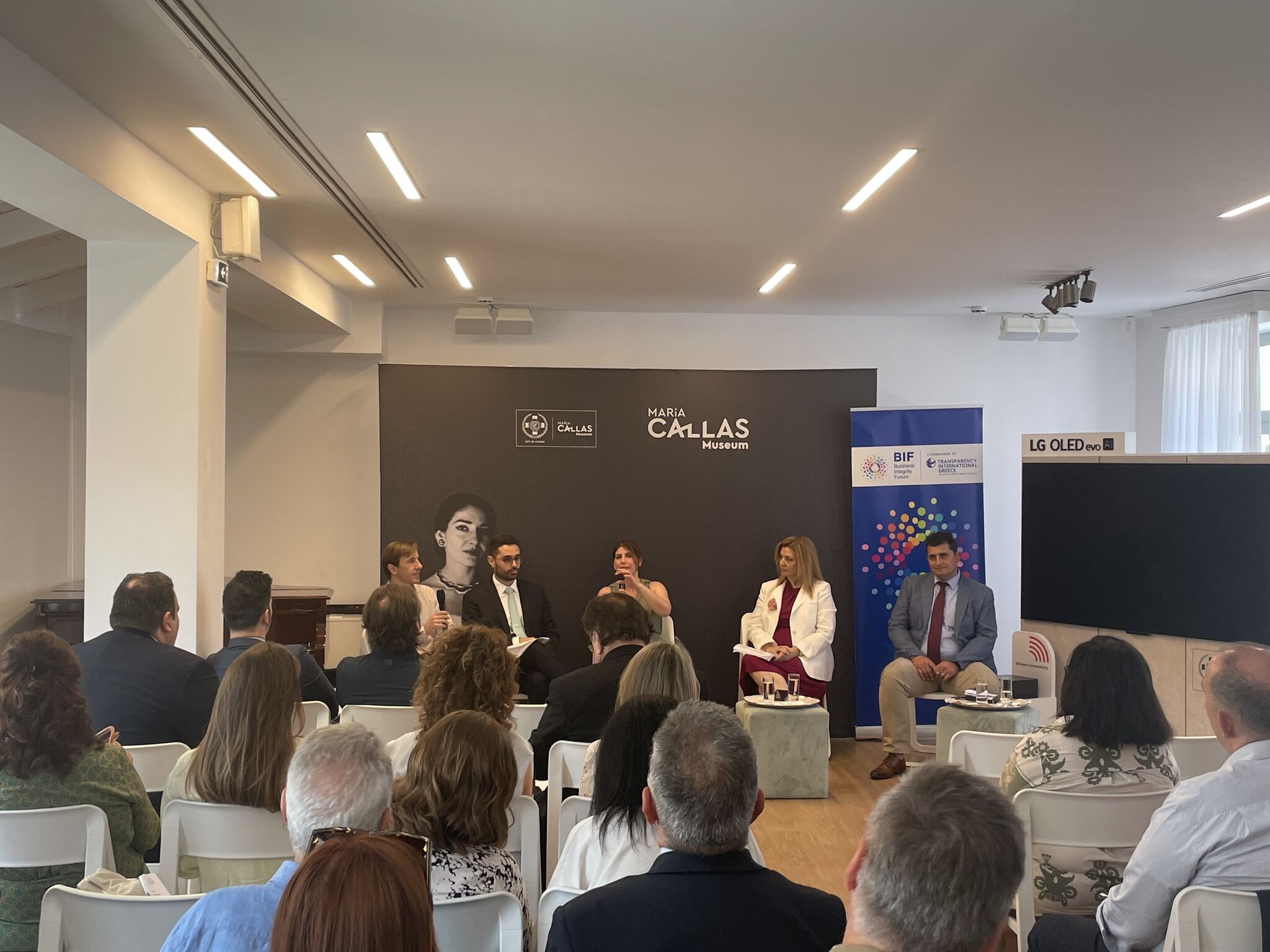Speech by Homo Digitalis at the 9th Conference of Young Lawyers in Thessaloniki
ELSA Thessaloniki and the Association of Trainee and Young Lawyers of Thessaloniki (EANDiTh) are organizing the 9th Conference of Young Lawyers today and tomorrow at the Thessaloniki Chamber of Commerce and Industry.
It is a great honor for Homo Digitalis to participate in this event, and we sincerely thank the organizers for their kind invitation.
More specifically, tomorrow, November 1, from 10:45 to 12:15, during the first panel of the day entitled “Contemporary Issues of Liability in the Digital World,” our member Melina Skondra will speak.
She is a Lawyer admitted to the Supreme Court, DPO, CIPP/E, and holds an MSc in Law & Informatics (University of Macedonia), with unique specialization in relevant fields.
The title of her presentation is “GDPR & Compensation.”
The line-up of the other speakers includes:
Spiros Tassis, POTAMITISVEKRIS (TMT, Data & IP), Chairman of the Hellenic Data Protection and Privacy Association, and Member of the Board of the European Federation of Data Protection Officers (EFDPO)
Athanasios-Antonios Leontaris, Lawyer / Legal Counsel and Industry Fellow at the Institute for the Future, University of Nicosia
Pavlos Salonikidis, Lawyer admitted to the Courts of Appeal, holder of an LL.M. in International and European Legal Studies, Faculty of Law, Aristotle University of Thessaloniki
We look forward to seeing you there!
Speech by Homo Digitalis at an event of the Global Shapers Thessaloniki Hub on AI
It is a great pleasure for Homo Digitalis to participate in the Global Shapers Thessaloniki Hub event series, “Coffee with Shapers”!
The theme of the event is AI & Human Rights and it will take place on Saturday, November 1, 2025, from 16:30 to 20:00, at OKTHESS.
Homo Digitalis will be represented by our members Evi Fotopoulou and Dimos Kostoulas.
Admission is free, and the registration form is available here.
We would like to warmly thank the organizing team and Emily Fisher for the kind invitation!
Homo Digitalis speaks at the 1st Seminar of the GNCHR Educational Seminar Series on “Artificial Intelligence: Levels of Protection”
With great success and active public participation, on Monday, September 29, 2025, the opening event of the Educational Seminar Series of the Greek National Commission for Human Rights (GNCHR) took place in the event hall of the Athens Bar Association (DSA), under the theme:
“The Next Day of Rights: Artificial Intelligence – Sustainability – Securitization.”
Homo Digitalis had the great honor of contributing with a presentation in the first seminar of the series, titled “Artificial Intelligence: Levels of Protection.”
Opening remarks were delivered by Marinetta Gounari–Chatzisarantou, Vice President of the Athens Bar Association, while the event was moderated by Giannis Ioannidis, First Vice President of the GNCHR.
Speakers at the seminar included, in order:
Sofia Kastranta, Senior Legal Advisor, Special Legal Service of the Ministry of Foreign Affairs
Dr. Efrosini Siougle, Expert Scientist in Informatics, Head of the Advisory and Compliance Mechanisms Department of the Hellenic Data Protection Authority
Eleftherios Chelioudakis, LL.M, M.Sc, Lawyer and Executive Director of Homo Digitalis
Dr. Christos Tsevas, Expert Scientist of the GNCHR
We warmly thank the Greek National Commission for Human Rights for the kind invitation to participate!
You can watch the full event here.
The second seminar will take place at the Athens Bar Association on Monday, October 13, from 17:00 to 19:00, on the topic: “Artificial Intelligence: Rights.”
Find more information here.
European Digital Identity Wallet (EUDI Wallet): The Uncomfortable Truth Behind the Innovation
By Giannis Konstantinidis*
Note: This is the English translation of the original article which was written in Greek.
A critical look at the EU’s new “wallet” and the hidden risks it poses to personal data protection and privacy in the digital age.
What are digital identities?
Digital identities are the set of information (e.g. name, professional status, address, telephone number, password) that characterise us when we use digital services on the Internet. In simple words, they are our “digital selves” when we connect to social networking platforms, e-government services, e-banking systems, etc. In practice, digital identities contain personal data which in many cases are also sensitive (e.g. in the case of e-health services). Therefore, digital identities must enable fast and trouble-free access to digital services and meanwhile be accompanied by strict safeguards regarding information security and data protection.
How have digital identities evolved?
There are three main models for organising digital identities (Figure 1). In the centralised model, an organisation maintains a central database with the digital identities of all users. A key disadvantage of the centralised model is that users must maintain a separate account for each digital service they use. In contrast, in the federated model, organisations cooperate with each other and exchange digital identity information using a common protocol. For example, if a user has an account with a central provider (e.g. Facebook, Google, Microsoft or gov.gr), then they can log-in to another compatible digital service with the same information. Therefore, the federated model is quite easy to use, although the overall management of digital identities and their attributes is carried out by a few providers (who might be aware of the users’ activities).

Figure 1: In the centralised model, users have separate accounts (and passwords) for each service they use. In contrast, in the federated model, there are a few providers that act as single “gateways” to services. Finally, in the decentralised model, users use their digital wallets and ideally choose the specific information they want to share with service providers. (Creator Giannis Konstantinidis)
Therefore, in both the centralised and the federated model, a major concern is the concentration of a large amount of data in central locations that are considered attractive to malicious attackers (see massive data breaches). As an “antidote”, the decentralised model has been proposed, which is often associated with the concept of “self-sovereign identity” (SSI). In this model, the user controls all the identity elements that are to be used by the services. Instead of relying upon a few providers, each user holds a set of “credentials”, which have been issued by trusted entities, and maintains them in an application called a digital wallet or digital identity wallet. When the user needs to prove something (e.g. their age), the digital credential is directly presented (signed beforehand by a trusted organisation that serves as the issuer). Ideally, the presentation of that digital credential reflects the minimum amount of the required data and does not reveal the entire personal data of the user.
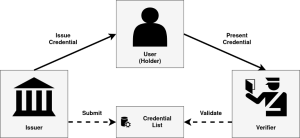
Figure 2: In the decentralised model, the issuer generates and delivers a credential to the user (holder) who stores it in the digital wallet. The user then presents the credential to a verifier, i.e. an organisation that requests confirmation of the user’s identity and/or status. The validity of the credential is verified based on the information found in a registry.(Creator Giannis Konstantinidis)
What is happening in the EU with digital identities?
With the revision of the eIDAS Regulation (2024/1183), the European Commission has established that each EU Member-State must offer its citizens a digital identity wallet. This will be an application for mobile devices in which each user will be able to store documents in digital form (e.g. ID cards, driving licenses, educational qualifications, social security documents and other travel documents). The user's interaction with the respective services will be done through the wallet, i.e. the user will select the credentials they wish to share. As mentioned earlier, the entire documents are not sent by each user, but a selected presentation of certain data in combination with the appropriate digital evidence that cryptographically proves the validity of those documents. Admittedly, the original vision of a “sovereign identity” seems to be significantly limited in the current design of the EUDI Wallet. In particular, the draft architecture (i.e. Architecture and Reference Framework - ARF) foresees the use of a traditional Public Key Infrastructure (PKI). Simply put, instead of leveraging a fully decentralised system, the European Commission chooses to leverage existing infrastructures that collect digital identity data. As such, it is more of a cross-border federated model in which users are responsible for managing and sharing their credentials on their own, rather than a fully decentralised model.
Is the protection of privacy and personal data enhanced or undermined?
Based on current developments, several risks related to data protection and privacy arise. First, the wallet can generate unique identifiers for each user (although theoretically this is necessary to identify the user when accessing cross-border services in the EU) and several experts express fear that these identifiers will allow for the continuous monitoring and correlation of all user activities.
In particular, according to the position of a group of distinguished academics (specialists in cryptography), the proposed architecture does not include sufficient technical measures to limit the “observability” and prevent the “linkability” of user activities. This means that even if user activities are carried out through the use of pseudonyms, there is no special care to prevent service providers from collecting usage patterns and correlating them with each other. So, in practice, this gap allows the tracing of user activities. The latest version of the architecture (ARF 2.3.0) recognises these risks, however, the integration of appropriate mechanisms remains at the level of discussion and has not yet been implemented (due to complexity and certain technical limitations). The European Telecommunications Standards Institute (ETSI) recognises the importance of technical measures, such as zero-knowledge proofs (ZKPs), but it is shown that (for the time being) the complete elimination of tracking is not feasible due to the technical complexity and lack of interoperability.
Regarding the overall “flexibility” and accountability of the ecosystem, there are also several negative comments. For example, if a service decides to request more data than necessary, there is no mechanism for prevention or even control. At the same time, it is considered that a huge share of responsibility will be shifted to users, because they will be constantly asked to approve the credentials that will be shared with service providers. In fact, if something goes wrong (e.g. in the event of theft of the user’s device or electronic fraud), there are no sufficient protection measures and therefore the user bears a large share of the responsibilities. In fact, there is no provision (so far) for any kind of recovery or restoration process.
Finally, an additional concern relates to the expansion of the wallet's functionalities, as it is going to gradually collect all kinds of electronic documents and certificates (e.g. even travel credentials and electronic payment details). Thus, the risk of a "surveillance dossier" emerges, where a malicious analyst or attacker could discover an extensive set of information about a person through a single medium.
Towards a cautious acceptance or questioning of the framework?
Although the EUDI Wallet is an important step in the development of modern digital services on the Internet, it comes with several challenges. If citizens are to trust such a technological solution, they must do so with full awareness of the advantages as well as the potential risks involved. At the same time, experts must further develop and document the mechanisms that contribute to security and privacy, otherwise we risk moving from a “wallet that empowers users to protect their data” to a “wallet that exposes data arbitrarily”. Finally, the contribution of experts and civil society organisations is extremely important, as gaps and possible omissions can be identified and corrected before the final implementation.
*Giannis Konstantinidis (CISSP, CIPM, CIPP/E, ISO/IEC 27001 & 27701 Lead Implementer) is a cybersecurity consultant and member of Homo Digitalis since 2019.
Homo Digitalis successfully completed its presentation at a conference of the Ministry of Justice & the Administrative Court of First Instance of Athens on Artificial Intelligence
On Monday, June 16, 2025, the Ministry of Justice hosted a conference on “Artificial Intelligence in Justice”!
In the third discussion panel titled “Limitations and Risks”, Homo Digitalis was represented by Stefanos Vitoratos, Co-founder of Homo Digitalis and Partner at Digital Law Experts (DLE).
The discussion was moderated by Sophia Papadimitriou, with speakers:
Lilian Mitrou, Professor at the University of the Aegean, President of the Institute for Privacy Law, Personal Data and Technology
Ioannis Angelou, Administrative Court Judge, PhD
Aris Dimitriadis, Member of the Ethics Committee of the AI Catalyst Group, Executive Director of Regulatory Compliance and Corporate Risk Management at OTE Group
The conference was organized by the Administrative Court of First Instance of Athens, with the support of the AI Catalyst Group!
Schools in Messinia at the Heart of Digital Awareness
From March 31 to May 7, the NGO Homo Digitalis visited 11 primary and secondary schools across Messinia, bringing education and awareness on internet safety closer to students.
During the workshops held in Arfara, Dorio, Eva, Thouria, Kalamata, Kyparissia, Pylos, Filiatra, Finikounda, and Chora, a total of 554 students engaged with key issues of the digital world, such as: cyberbullying, online safety, recognition and understanding of deepfakes, and responsible use of social media.
Raising awareness and informing both children and adults is a vital step toward a safe and healthy experience in the digital space.
The initiative was supported by the “Captain Vassilis and Carmen Constantakopoulos” Foundation and it will continue with new sessions from September to December 2025.
If your school is located in Messinia and would like to host these free educational sessions, please contact the Homo Digitalis team at info@homodigitalis.gr.
Homo Digitalis successfully participated in the Business Integrity Forum of Transparency International
Today, Homo Digitalis took part in the 17th Round Table titled “Greek Business and Transparency: Building Trust and Competitiveness”, organized within the framework of the Business Integrity Forum, a commitment of Transparency International Greece!
Specifically, Lamprini Gyftokosta from our team moderated the panel “AI and Ethics in Business Compliance”, with contributions from Alexandros Nousias (Institute of Informatics & Telecommunications at NCSR Demokritos), Panagiotis Sourlas (Growthfund, the National Fund of Greece), Irene Papadopoulou (ΣΟΛ Crowe), and Sofoklis Karapidakis (Metlen Energy & Metals).
We warmly thank the organizers and the Executive Director of Transparency International Greece, Angelos Kaskanis, for the kind invitation!
